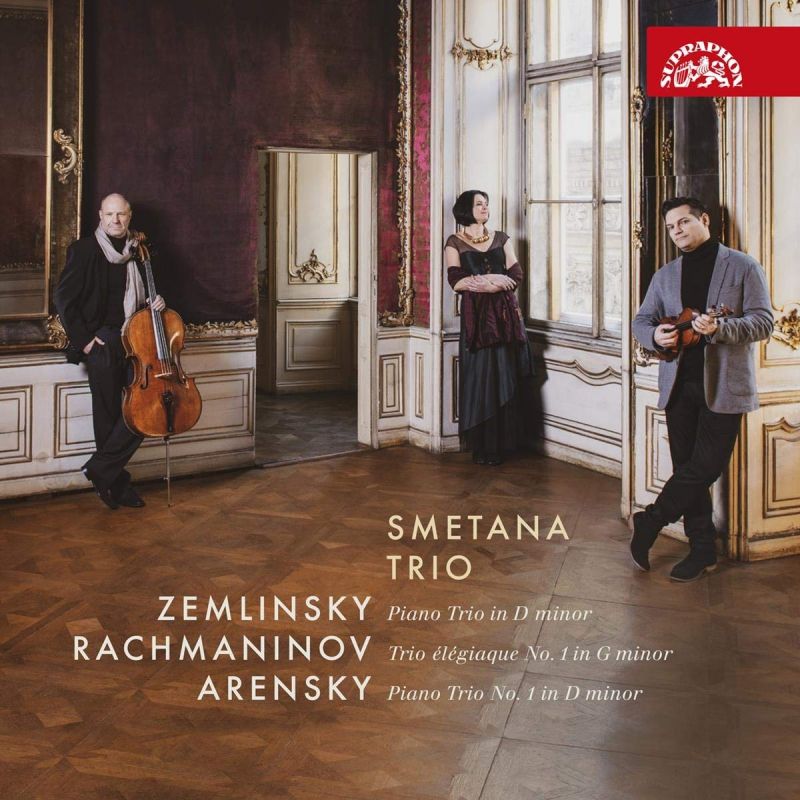ZEMLINSKY; RACHMANINOV; ARENSKY Piano Trios
View record and artist detailsRecord and Artist Details
Composer or Director: Sergey Rachmaninov, Alexander von Zemlinsky, Anton Stepanovich Arensky
Genre:
Chamber
Label: Supraphon
Magazine Review Date: 06/2019
Media Format: CD or Download
Media Runtime: 74
Mastering:
DDD
Catalogue Number: SU42582

Tracks:
| Composition | Artist Credit |
|---|---|
| Trio for Clarinet/Viola, Cello and Piano |
Alexander von Zemlinsky, Composer
Alexander von Zemlinsky, Composer Smetana Trio |
| Trio élégiaque |
Sergey Rachmaninov, Composer
Sergey Rachmaninov, Composer Smetana Trio |
| Piano Trio No. 1 |
Anton Stepanovich Arensky, Composer
Anton Stepanovich Arensky, Composer Smetana Trio |
Author: Harriet Smith
Zemlinsky was in his mid-twenties when he wrote his D minor Trio, initially conceived as a trio for clarinet, cello and piano and composed for a competition (in which he came third). He then reworked it for the present line-up, which is more effective still, the violin able to stand out from the texture in a way the clarinet cannot. It’s full of good things – the slow movement in the Smetana’s reading is allowed to dream but never sounds indulgent (I find the Beaux Arts a little slow here), and the violin and cello lines entwine with great affection. The finale’s combination of skittishness and expressive writing is well done, too, and the pianist ensures that the sometimes richly Brahmsian textures never overwhelm the balance.
Rachmaninov was just 19 when he wrote his first Trio élégiaque. The Smetana are alive to the piece’s mix of tenderness and passion, and they produce some thrillingly hushed playing. Kremer’s recent recording with Giedrė Dirvanauskaitė and Daniil Trifonov is a little more driven, with climaxes perhaps more overtly exciting, but the sensitivity with which the players interact on the new recording is very winning. Just sample the cellist’s rendition of the aching melody (track 4, from 9'09"), which is given due time to breathe, compared to which Kremer’s group sound somewhat edgier.
Arensky’s First Trio was written two years after the Rachmaninov and, like much of his music, it deserves to be better known. The Smetana make a very strong case for it, with the string players constantly varying the colouring of the Schumannesque main theme of the first movement. The Wanderer are a degree more Classical in their approach but I like the wholeheartedness of this new set. The Scherzo has a tremendous sense of play and energy to it, the Smetana enjoying Arensky’s imaginative string textures, whereas the Wanderer opt for a more highly polished finish; I particularly like the warmth the Czech players bring to its Trio. The Smetana’s slower tempo for the Adagio plays up its elegiac quality, giving it a sombre beauty that is very telling. The finale has a real drama and drive, the Smetana making much of the contrast between jagged energy and the more lyrical moments. The reintroduction near the close of the theme that opened the work makes for a touching farewell, and is particularly potently realised by the Smetana Trio.
Discover the world's largest classical music catalogue with Presto Music.

Gramophone Digital Club
- Digital Edition
- Digital Archive
- Reviews Database
- Full website access
From £8.75 / month
Subscribe
Gramophone Full Club
- Print Edition
- Digital Edition
- Digital Archive
- Reviews Database
- Full website access
From £11.00 / month
Subscribe
If you are a library, university or other organisation that would be interested in an institutional subscription to Gramophone please click here for further information.




